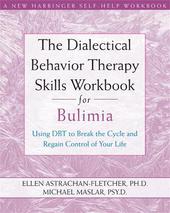
|
Dialectical Behavior Therapy Workbook for Bulimia: Using DBT to Break the Cycle and Regain Control of Your Life
Paperback / softback
Main Details
| Title |
Dialectical Behavior Therapy Workbook for Bulimia: Using DBT to Break the Cycle and Regain Control of Your Life
|
| Authors and Contributors |
By (author) Ellen Astrachan-Fletcher
|
| Physical Properties |
| Format:Paperback / softback | | Pages:200 | | Dimensions(mm): Height 254,Width 205 |
|
| ISBN/Barcode |
9781572246195
|
| Classifications | Dewey:616.852630651 |
|---|
| Audience | | Tertiary Education (US: College) | | Professional & Vocational | |
|---|
|
Publishing Details |
| Publisher |
New Harbinger Publications
|
| Imprint |
New Harbinger Publications
|
| Publication Date |
1 August 2009 |
| Publication Country |
United States
|
Description
At the root of bulimia is a need for control over one's body, environment, and feelings of self-worth. Instead of coping with negative feelings in healthy ways, people with bulimia binge and purge. This book is for people who attempt to calm intense, negative emotions through their bulimia-people who feel that by controlling their weight, they will be able to better control their lives. The Dialectical Behavior Therapy Skills Workbook for Bulimia teaches readers a healthier coping mechanism for dealing with their feelings called dialectical behavior therapy (DBT). Using skills drawn from this proven approach, along with motivational interviewing, readers learn to regulate their emotions in effective ways that are healthy for mind and body. Worksheets and exercises throughout the book help readers put new skills like commitment, mindfulness, distress tolerance, emotion regulation, and interpersonal effectiveness into practice. This book also helps readers identify and address mental health conditions, such as anxiety and depression, that are often comorbid with bulimia.
Author Biography
Ellen Astrachan-Fletcher, Ph.D., is founder and director of the eating disorders clinic at the University of Illinois Medical Center, where she is also an associate professor. She has over ten years of clinical experience as a licensed clinical psychologist, specializing in eating disorders and women's mental health issues. She is a member of the American Psychological Association and the Academy for Eating Disorders. Michael Maslar, Psy.D., is founder and director of the Mindfulness and Behavior Therapies Program at The Family Institute at Northwestern University. He is also an assistant professor at Northwestern University Medical School in Chicago, IL. Maslar has extensive training in dialectical behavior therapy (DBT) and is a member of the American Psychological Association and the Association for Behavioral and Cognitive Therapies.
Reviews"At first, I was very reluctant to join a DBT group, as I thought that I had control over my eating disorder. However, once I decided to participate in a group, I was hooked. For over two years, I have been involved in DBT. DBT has been a life-altering experience and my commitment has truly helped me to be present and create a life worth living." --Carissa, client of coauthor Ellen Astrachan-Fletcher "At my first dialectical behavior therapy (DBT) skills training session, I found it easier to speak without using vowels than to speak without judgment. I was skeptical, but desperate to have a life without my eating disorder, and once desperation won the battle over skepticism, I was in. Once I was able to chip away at the judgment, I began to think it might be possible there was a way to deal with distress that didn't involve binge-purging. Before DBT, my emotions were something that required treatment. Happy, sad, angry, or glad, if I felt something, bulimia was right there to take me back to a state of numbness. Being able to radically and mindfully accept, without judgment, that I could actually experience an emotion and not have it end with a binge was a fascinating revelation. I still fight with bulimia, but I am armed with the tools of DBT and it's now a battle I have a chance of winning." --Ilene, client of coauthor Ellen Astrachan-Fletcher "DBT has given me an appreciation for what I believed to be the most insignificant pieces in life: what is going on around me in the present moment. My eating disorder had taken away the familiarity of the simplest joys in life and had focused my attention to my body, exercise, and food. DBT had helped me refocus my attention to the present moment, rather than the past or future." --Annie, client of coauthor Ellen Astrachan-Fletcher "DBT has taught me how to meditate more effectively throughout the day, regulate my emotions, and tolerate the most uncomfortable and painful of times. I never knew how to ride the rollercoaster of life without resorting to bingeing until DBT helped to change my behavior and my life. Because DBT centers on mindfulness--being in the present moment--and having both acceptance of my condition as well as the willingness to change, I can now show up for my life without resorting to bingeing or other crutches. DBT has changed my life, and I have faith that it can change yours!" --Sharon, client of coauthor Ellen Astrachan-Fletcher "My commitment to DBT has brought me to an understanding of living in the moment. I now carry the benefits of instinctively knowing how to embrace life in an effective way. It is amazing how the exercises brought me to the awareness of just how little time I am now spending thinking obsessive thoughts about exercise and food!" --Eileen, client of coauthor Ellen Astrachan-Fletcher "This self-help workbook is an excellent tool to help alleviate bulimia nervosa symptoms. It is also a useful guide for the practitioner who is assisting the patient in his or her quest to overcome an eating disorder. I highly recommend this workbook to sufferers and mental health professionals alike." --Daniel le Grange, Ph.D., professor and director of the eating disorders program at the University of Chicago
|